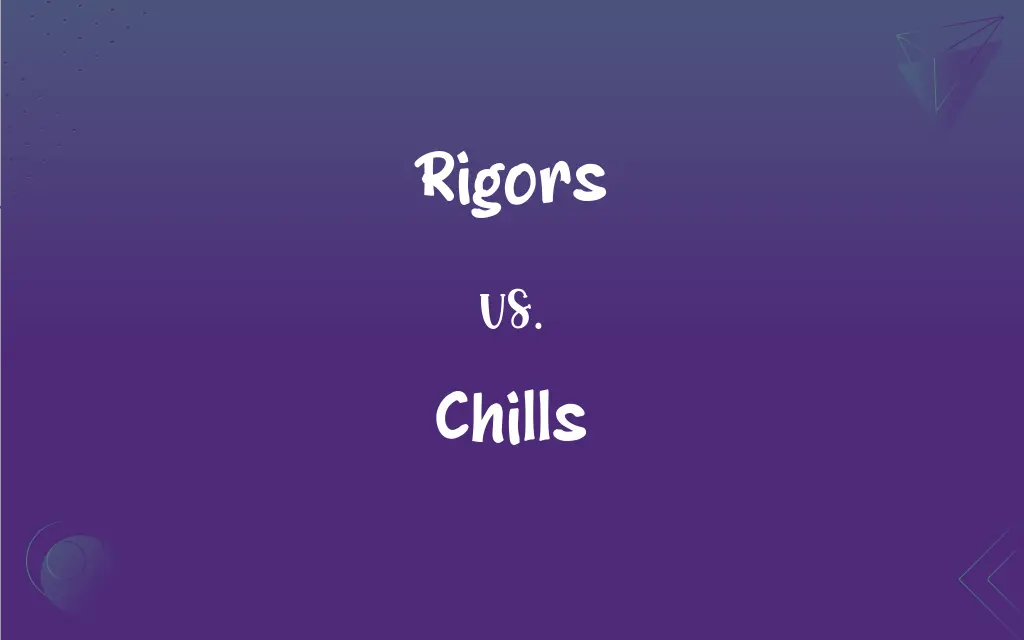Rigors vs. Chills: What's the Difference?
Edited by Aimie Carlson || By Janet White || Published on January 29, 2024
"Rigors" are intense shivering associated with a high fever, usually indicating a serious medical condition, while "chills" are milder shivers that may not be linked to fever.

Key Differences
Rigors are severe, often involving teeth chattering and body shaking, typically indicating a serious medical condition like an infection. Chills, however, are generally milder, often experienced as a light shivering sensation without the intensity of rigors.
Rigors are commonly associated with a sudden increase in body temperature and are often a symptom of high fever. Chills can occur with or without fever, often as a result of feeling cold or as a mild symptom of various health conditions.
Rigors are usually more intense and can last longer than chills. They are often so severe that they cannot be controlled. Chills, on the other hand, are typically less intense and can often be alleviated with warm clothing or blankets.
Rigors are often a sign of serious infections, such as sepsis or pneumonia. Chills may be caused by less severe conditions, like a common cold, or simply from being in a cold environment.
Due to their severity, rigors often require medical attention to treat the underlying cause. Chills, unless accompanied by other serious symptoms, can usually be managed at home with warmth and rest.
ADVERTISEMENT
Comparison Chart
Intensity
Severe shivering, often uncontrollable
Milder, controllable shivering
Association with Fever
Typically associated with high fever
Can occur with mild or no fever
Duration
Longer duration, intense
Shorter, less intense
Underlying Causes
Often indicate serious medical conditions
Can be due to various reasons, not always severe
Treatment and Response
Usually require medical attention
Often managed at home, may not need medical attention
ADVERTISEMENT
Rigors and Chills Definitions
Rigors
Extreme shivering as part of a body's reaction to a significant infection.
The doctor noted the onset of rigors as a critical symptom.
Chills
Mild shivering or feeling cold without an associated fever.
She felt chills when the room temperature dropped.
Rigors
Intense, uncontrollable shivering usually accompanying a high fever.
The patient experienced rigors indicating a possible serious infection.
Chills
Light shivering that can be a symptom of various health conditions.
The chills were her first sign of coming down with a cold.
Rigors
Severe shaking of the body as a medical sign of high fever.
His rigors were so intense that they shook the bed.
Chills
A sensation of coldness, often with shivering, but not as intense as rigors.
He got chills every time he went outside in the winter.
Rigors
A clinical symptom indicating a possible bacterial or viral infection.
The presence of rigors led to further tests for serious infections.
Chills
A feeling of coldness, sometimes accompanying mild fever.
After getting soaked in the rain, she experienced chills.
Rigors
A symptom of severe chills and shaking in response to illness.
Rigors set in as the patient's fever spiked overnight.
Chills
A common symptom of mild illnesses or simply being in a cold environment.
The sudden chills made her reach for a warm blanket.
Rigors
Strictness or severity, as in action or judgment
"The desert fostered a closed world of faith and rigor and harsh judgment.
Chills
A moderate but penetrating coldness.
Chills
A sensation of coldness, often accompanied by shivering and pallor of the skin.
FAQs
What causes chills?
Chills can be caused by cold environments, mild illnesses, or sometimes fever.
What are rigors?
Rigors are intense, uncontrollable shivering, typically with high fever.
Can stress cause rigors?
Stress is not a typical cause of rigors, which are usually due to infection.
Can chills occur without fever?
Yes, chills can happen without a fever.
What are common triggers for rigors?
Serious infections like sepsis or pneumonia can trigger rigors.
How long do rigors last?
They can last from minutes to hours, depending on the cause.
Are rigors a medical emergency?
They can indicate a serious condition, so medical advice is often needed.
Are chills a sign of the flu?
Chills can be a symptom of the flu, among other conditions.
Are chills common with a common cold?
Chills can occur with a cold, though they are not as severe as with the flu.
Can hydration help with rigors?
Hydration is important, but rigors usually need specific medical treatment.
Can rigors occur without fever?
It's rare; rigors are usually associated with high fever.
Are elderly more susceptible to rigors?
Elderly individuals may experience rigors, especially with infections.
Is it normal to experience chills when cold?
Yes, feeling cold can naturally lead to chills.
Do rigors require treatment?
Treating the underlying cause of rigors is important.
Can anxiety cause chills?
Anxiety can sometimes cause chills due to physiological responses.
How are rigors different from seizures?
Rigors involve shivering, whereas seizures involve uncontrolled body movements.
Is shivering the same as chills?
Shivering is a form of chills, but not as intense as rigors.
Can children experience rigors?
Yes, children can experience rigors, often requiring medical attention.
Should I see a doctor for chills?
If chills are persistent or accompanied by other symptoms, see a doctor.
Can rigors be a sign of malaria?
Yes, rigors can be a symptom of malaria, among other infections.
About Author
Written by
Janet WhiteJanet White has been an esteemed writer and blogger for Difference Wiki. Holding a Master's degree in Science and Medical Journalism from the prestigious Boston University, she has consistently demonstrated her expertise and passion for her field. When she's not immersed in her work, Janet relishes her time exercising, delving into a good book, and cherishing moments with friends and family.
Edited by
Aimie CarlsonAimie Carlson, holding a master's degree in English literature, is a fervent English language enthusiast. She lends her writing talents to Difference Wiki, a prominent website that specializes in comparisons, offering readers insightful analyses that both captivate and inform.































































